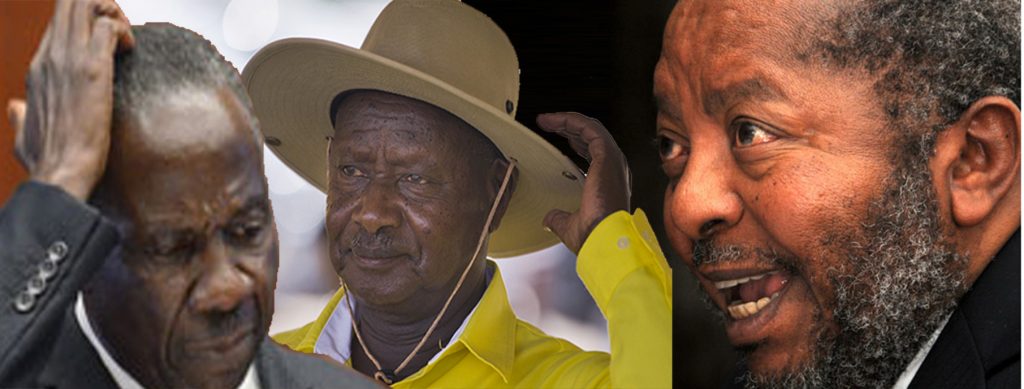
Bank of Uganda governor Tumusiime Mutebile (R), President Museveni, and the Finance Minister Matia Kasaijja (L)
Bank of Uganda (BoU) has announced that the volume of mobile money transactions declined by Shs672bn within the first two weeks of July since the coming into effect of the 1% tax on mobile money.
BoU officials led by Charles Abuka, director of Statistics, said this while appearing before the parliamentary committee on Finance, Economic Planning and Development that is currently re-scrutinizing the Excise Duty (Amendment) (No.2) Act, 2018 that was recently re-tabled by Finance minister Matia Kasaija for reconsideration.
Abuka told MPs on the committee that this new mobile money tax should be dropped because it is unfair, repressive and unequitable and that will not lead to increased revenue collection as projected by government.
“Indeed, the value of mobile money transactions declined by Shs672bn in the first two weeks of July 2018 compared to the first two weeks of June 2018 in part following the announcement of the Excise Duty (Amendment) Act 2018 introducing a tax of 1% of the value of the transaction that would apply on mobile money transactions,” Abuka said.
The Excise Duty (Amendment) Bill now before Parliament seeks to amend the Excise Duty Act, 2014 to limit the taxable mobile money transactions to withdrawal and to reduce the duty payable to 0.5% from 1% of the value of the transaction.
Abuka said that even though the proposed bill reduces the tax to 0.5% and limits it to withdrawals, it is still not neutral, fair, equitable and has the additional dangers of retarding growth of financial inclusion.
“Deepening inclusion by broadening the use of more advanced financial products and services could help Uganda move towards a more formalized, transparent and dynamic economy. Unfortunately, the tax on mobile money transactions seems to reverse the financial inclusion progress,” he said.
“The tax (mobile money tax) is neither neutral nor equitable between like forms of business activities. The same tax doesn’t apply to withdrawals from banks or microfinance institutions or SACCOs. In this sense, neutrality also entails that the tax system raises revenue while minimizing discrimination in favour of, or against any particular economic choice. This implies that the same principles of taxation should apply to all forms of business, while addressing specific features that may otherwise undermine an equal and neutral application of those principles.”
Before it was returned to Parliament, the Excise Duty (Amendment) Bill, 2018 was read for the first time on the 3rd April 2018 and referred to the Committee on Finance, Planning and Economic Development in accordance with Rule 118 of the Rules of Procedure of Parliament. It was passed on May 30 and implemented on July 01, but later on returned to Parliament after public protests for its repressiveness.




























